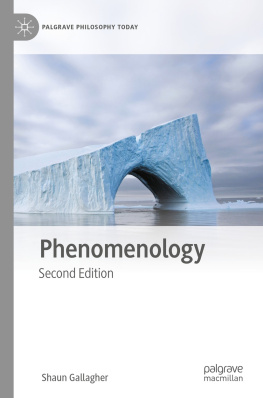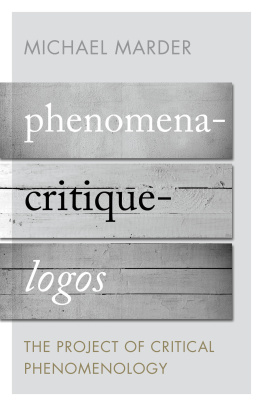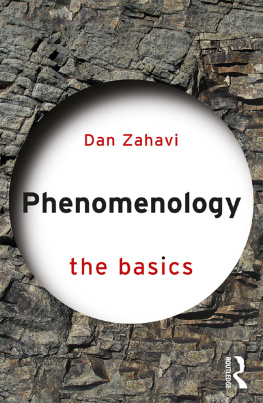Kenneth Knies - Crisis and Husserlian Phenomenology
Here you can read online Kenneth Knies - Crisis and Husserlian Phenomenology full text of the book (entire story) in english for free. Download pdf and epub, get meaning, cover and reviews about this ebook. publisher: Bloomsbury UK, genre: Religion. Description of the work, (preface) as well as reviews are available. Best literature library LitArk.com created for fans of good reading and offers a wide selection of genres:
Romance novel
Science fiction
Adventure
Detective
Science
History
Home and family
Prose
Art
Politics
Computer
Non-fiction
Religion
Business
Children
Humor
Choose a favorite category and find really read worthwhile books. Enjoy immersion in the world of imagination, feel the emotions of the characters or learn something new for yourself, make an fascinating discovery.
- Book:Crisis and Husserlian Phenomenology
- Author:
- Publisher:Bloomsbury UK
- Genre:
- Rating:5 / 5
- Favourites:Add to favourites
- Your mark:
- 100
- 1
- 2
- 3
- 4
- 5
Crisis and Husserlian Phenomenology: summary, description and annotation
We offer to read an annotation, description, summary or preface (depends on what the author of the book "Crisis and Husserlian Phenomenology" wrote himself). If you haven't found the necessary information about the book — write in the comments, we will try to find it.
Crisis and Husserlian Phenomenology — read online for free the complete book (whole text) full work
Below is the text of the book, divided by pages. System saving the place of the last page read, allows you to conveniently read the book "Crisis and Husserlian Phenomenology" online for free, without having to search again every time where you left off. Put a bookmark, and you can go to the page where you finished reading at any time.
Font size:
Interval:
Bookmark:

Crisis and Husserlian Phenomenology
Crisis and Husserlian Phenomenology
A Reflection on Awakened Subjectivity
Kenneth Knies

BLOOMSBURY ACADEMIC
Bloomsbury Publishing Plc
50 Bedford Square, London, WC1B 3DP, UK
1385 Broadway, New York, NY 10018, USA
BLOOMSBURY, BLOOMSBURY ACADEMIC and the Diana logo are trademarks of Bloomsbury Publishing Plc
First published in Great Britain 2021
Copyright Kenneth Knies, 2021
Kenneth Knies has asserted his right under the Copyright, Designs and Patents Act, 1988, to be identified as Author of this work.
For legal purposes the constitute an extension of this copyright page.
Cover design by Jade Barnett
Cover image by Rene Bhmer/Unsplash
All rights reserved. No part of this publication may be reproduced or transmitted in any form or by any means, electronic or mechanical, including photocopying, recording, or any information storage or retrieval system, without prior permission in writing from the publishers.
Bloomsbury Publishing Plc does not have any control over, or responsibility for, any third-party websites referred to or in this book. All internet addresses given in this book were correct at the time of going to press. The author and publisher regret any inconvenience caused if addresses have changed or sites have ceased to exist, but can accept no responsibility for any such changes.
A catalogue record for this book is available from the British Library.
Library of Congress Cataloging-in-Publication Data
Names: Knies, Kenneth, author.
Title: Crisis and Husserlian phenomenology : a reflection on awakened subjectivity / Kenneth Knies.
Description: London ; New York : Bloomsbury Academic, 2020. |
Includes bibliographical references and index.
Identifiers: LCCN 2020019586 (print) | LCCN 2020019587 (ebook) |
ISBN 9781350145214 (hb) | ISBN 9781350145221 (ePDF) | ISBN 9781350145238 (ebook)
Subjects: LCSH: Husserl, Edmund, 18591938. | Crises (Philosophy) | Phenomenology. | Subjectivity.
Classification: LCC B3279.H94 K57 2020 (print) | LCC B3279.H94 (ebook) | DDC 142/.7dc23
LC record available at https://lccn.loc.gov/2020019586
LC ebook record available at https://lccn.loc.gov/2020019587
ISBN: HB: 978-1-3501-4521-4
ePDF: 978-1-3501-4522-1
eBook: 978-1-3501-4523-8
To find out more about our authors and books visit www.bloomsbury.com and sign up for our newsletters.
Also Available from Bloomsbury
Husserls Ethics and Practical Intentionality , Susi Ferrarello
Phenomenology and the Social Context of Psychiatry , Magnus Englander
Hermeneutics and Phenomenology , edited by Saulius Geniusas and Paul Fairfield
Heidegger and the Problem of Phenomena , Fredrik Westerlund
Contents
I am grateful to have known so many insightful and patient conversationalists who never tire of talking philosophy. Without their companionship, it would have been difficult to continue believing in the importance of ideas that dont make anything run. I am especially indebted to two former colleagues, Ed Papa and Marcello Kilani, for keeping me focused on this book. I am also mindful of the many people who made it possible for me to continue professionally in philosophy by giving generously of their time, advice, and resources. Special thanks in this regard to Donn Welton and George Heffernan. Finally, I want to acknowledge an anonymous reviewer from whose thoroughness I benefited greatly.
Consider the experience of realizing something that had previously escaped notice. Such realizations bring to light a strange kind of failure. It is not just that I did not notice something that I now notice. Instead, I am aware that what I now realize was previously noticeable for me but somehow inaccessible. I was blind to something that I now see to have been available all along. Of what I now realize, it seems true both that I was able and that I was unable to notice it before. It is as if I were kept from grasping something within my reach. In the experience under consideration, nothing external kept me from noticing what I now realize. I who realize hold myself responsible. We call navet this peculiar way of failing to notice and awakening the process of discovering this failure.
Reflecting on the awakening to navet raises difficulties about subjectivity and responsibility of special concern to phenomenology. We can anticipate these difficulties by noting that phenomenology is at once a philosophy of consciousness and a philosophy of crisis. Phenomenology is a philosophy of consciousness not in the sense that it is the philosophical study of a particular topic, consciousness. Phenomenology is rather a philosophy according to which the philosophical study of any topic proceeds via the study of consciousness. It is through actual and possible consciousness that whatever is not consciousness is what it truly is. This insight that consciousness functions transcendentally for all objectivity is the epicenter from which phenomenological researches radiate. Having established this insight, phenomenology has access to its subject matter in a unique way. Everything that exists in the material, animal, and spiritual realms can be elucidated in its being with reference to conscious activities that are open to reflection for the one who takes these things to be. Some consciousness is clear and some obscure. But they are both equally available as what they are to reflection. If consciousness is, nothing needs to happen for it to be available. The methods that make manifest its contents move within the availability of consciousness to itself.
Phenomenology is a philosophy of crisis because consciousness emerges from a life of transcendental navet. This is a philosophy according to which philosophical thinking begins by disengaging the default attitude of all human existence. In this natural attitude, the transcendental function of consciousness is concealed such that it has to be realized in the sense described above. Taking responsibility for transcendental navet ultimately involves reflections quite different from those that elucidate philosophical subject matter from the perspective of consciousness. The availability of that subject matter is itself the result of an awakening. And this awakening requires the phenomenologist to reorient herself to the history in which she stands. This history is not external to phenomenology. It is the history that phenomenology makes as philosophy. Phenomenology is of historical significance insofar as it necessitates the transformation of human projects that cannot achieve their aims in transcendental navet. To be in crisis is to face the practical necessity of this transformation, the impossibility of going forward without it. In clarifying the crisis, the phenomenologist regards herself as an agent of the projects she critiques. As such, she attempts to discern what these projects are and who she has become by sharing responsibility for their fate.
This study tries to understand how phenomenology is at once a philosophy of consciousness and of crisis. We will develop both dimensions of philosophical concern beginning from an examination of presuppositions. We define a presupposition as a necessary condition that is realized in an awakening to navet. The one who realizes a presupposition takes responsibility for her navet by regarding herself as the subject of a past act of presupposing. This thought that it was I, the awakened I, who presupposed opens an appropriative relation to my own history. To resume wakefully what I was doing naively, I have to comprehend the course of my nave activity from the perspective of its previously inaccessible condition. We will explore these dynamics beginning from presuppositions realizable within the natural attitude. This exploration will prepare us to see how the phenomenological attitude is founded on the realization of consciousness as the universal presupposition of natural-attitude life. This account of the phenomenological attitude will, in turn, prepare an argument for the perennial importance of the crisis problematic to the philosophy of consciousness. Thinking through the crisis is the only way to appropriate certain ultimate presuppositions that condition that philosophy.
Next pageFont size:
Interval:
Bookmark:
Similar books «Crisis and Husserlian Phenomenology»
Look at similar books to Crisis and Husserlian Phenomenology. We have selected literature similar in name and meaning in the hope of providing readers with more options to find new, interesting, not yet read works.
Discussion, reviews of the book Crisis and Husserlian Phenomenology and just readers' own opinions. Leave your comments, write what you think about the work, its meaning or the main characters. Specify what exactly you liked and what you didn't like, and why you think so.











